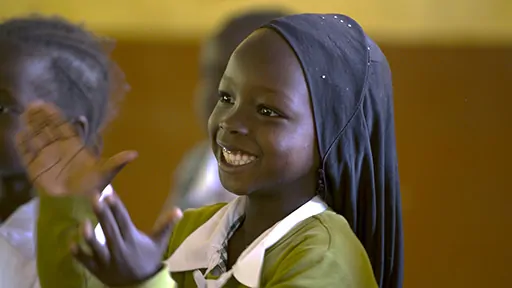Opinion Editorial Archive March, 2018: Blackface, Phenotypes and Stereotypes

This month's photo was not made in China. It was made in The Gambia, West Africa. The subject does not belong to China's majority ethnic group, the Han. She belongs to The Gambia's majority ethnic group, the Mandinka (Mandingo). She is not celebrating China's most important event, the Lunar New Year (of the dog, in 2018). The photo was taken a month before that event. She is instead singing a simple welcome song for the visitor to her school.
You might be forgiven, then, if you thought she had no association with China. Alas, you'd be wrong. China's investments in Africa are one of the major economic stories of the last decade. Since relations were restored two years ago, those investments now extend to, and are increasing in, The Gambia. While this girl's village is too remote to see any impact, she will likely live long enough to see one.
You may hold stereotypical views of African people. That this girl has a black face is, however, not a part of your stereotype. It is a part of her (negroid) phenotype. That Africans welcome China's investments in their continent is not a part of the Han's (mongoloid) phenotype. It is a part of their stereotype about African people. Being a stereotype it is far from universally true: the day I took the photo, this girl and her classmates were not singing in celebration of Chinese investment in their country.
The Lunar New Year took place in the middle of last month. Part of the theme for this year's accompanying TV show was China's investments in Africa. In one segment of that show a young African woman is introducing her "husband" to her mother. Accompanied on stage by a pantomime monkey, played by a black Ivorian man (it is unclear whether this monkey is meant to be her husband or a domesticated pack animal), the role of the mother is played by a Chinese actress in makeup known as "blackface" with hugely exaggerated prosthetic buttocks.
It appears that this part of the show was intended as comedy; it ended as controversy. In many parts of the world (including China and Africa) it was criticized as racism. Much of that criticism in China was on social media platforms. Not surprisingly, most of it was immediately censored there.
Any visitor to The Gambia can easily visit Mandinka communities. While there, they will see African women. Some of those women will be larger than others and most, if not all, will be larger than the average Han woman. Such differences present an opportunity for open dialog. The Chinese government clearly does not want such open dialog inside its borders. In fact we saw last month that China's neighbor, North Korea, may be more open to such dialog. By the time this girl is a woman there may be better education in China about phenotypes and stereotypes. But somehow I doubt it.
Learn more about the Mandinka people.
If you enjoyed reading this month's opinion editorial, please consider supporting independent, advertising-free journalism by buying us a coffee to help us cover the cost of hosting our web site. Please click on the link or scan the QR code. Thanks!

